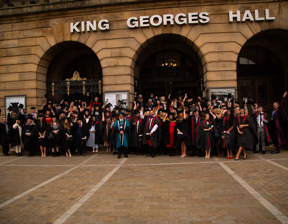Entry Requirements
In order to join BA (Hons) Working with Children and Young People (Top Up) programme you will need to have successfully completed FdA in Working with Children and Young People
Study Mode
Full time
Part time
Duration
Full time:
1 year
Part time
2 years
Timetable
Check with your tutor
Key Features & Benefits
- Validated by UK Top 15 Lancaster University
- Study in our dedicated University Centre at The Blackburn Learning Quarter
- Choose from a range of optional modules depending on your interests
- Small class sizes, providing you with more 1-to-1 support
- Benefit from industry-bespoke facilities such as The Health Ward and the Sensory Room
-
Overview
The focus of the course is on recruiting more people to the children's workforce, developing skills for partnership working and developing and enhancing leadership, management and supervision skills within the children and young person's workforce.
You will undertake six modules including a dissertation and will be able to specialise in a particular area through option modules.
-
What will I study?
All students take a total of 120 credits per level.
Level 6 Modules (there are 4 mandatory modules and 3 optional modules. You will need to choose two optional modules out of a choice of 3.
Modules include:
- Research Project (Dissertation)
- Applied Research Report (Dissertation)
- Management and Organisations
- Professional Development
- International Perspectives in Work with Children and Young People*
- Contemporary Psychotherapies*
- Contemporary Issues in Working with Children and Young People*
Optional Modules
If we have insufficient numbers of students interested in an optional module, this may not be offered. If an optional module will not be run, we will advise you as soon as possible and help you choose an alternative module.
-
Entry Requirements
In order to join BA (Hons) Working with Children and Young People (Top Up) programme you will need to have successfully completed FdA in Working with Children and Young People. If you have received less than a Merit grade overall in your Foundation Degree you will be required to attend a guidance interview first to ensure you are fully prepared for the Top Up programme. Additional preparation for study at the Top Up programme may be required.
Care Leavers or Young Carers
We want students from all backgrounds to have the opportunity to go to University. If you have spent three months or more in local authority care OR are a young carer, you will be eligible for a contextual offer. This is a grade reduction of 1-A Level grade below our standard entry requirements. For example, a standard offer of CCC, would become CCD. MMM at Level 3 Extended Diploma would become MMP. To apply we advise that you tick the box on your UCAS application which identifies you have spent time in care and to help identify you as eligible for our contextual offer.
-
How will I be assessed?
During the course you'll be assessed through a variety of methods. These include:
- Essays
- Seminars
- Examinations
- Portfolios
- Dissertations
- Reports
- Group presentations
- Projects and mini-dissertations
- In class tests
- Peer assessment
- Group assessment
This formal assessment will count towards your module mark and feedback is usually given within 3 weeks following the submission of your formal submission of work.
Additionally, some lecturers will provide informal feedback, for example, following an examination they may choose to work through the exam paper in a tutorial. It should be noted that feedback is part of the ongoing learning cycle which is not limited to written feedback. Other forms of feedback include one-to-one meetings with a personal tutor, dissertation and project supervision meetings, a lecturer responding to learner questions or responses during topic or situation discussions.
Feedback is intended to help you learn and you are encouraged to discuss it with your module tutor.
-
Teaching and Learning
The learning environment and facilities could include lecture theatres, classrooms, technology suites, laboratories and workshops, library and skills labs, art and photography studios, small group and quiet zones. Learning methods will vary according to the programme of study but will include lectures and group tutorials. In addition, seminars, field trips, work placements, role play or scenario activities, laboratory and workshop practical, demonstrations, guest lectures, discussions and debates all contribute to the learning experience to support the acquisition of subject specific skills and knowledge and the development of transferable and employment related skills.
You should typically expect to have around 15 contact hours per week if you are studying full time.
In addition, you will have timetabled meetings with your personal tutor.
You will be taught by an experienced teaching team whose expertise and knowledge are closely matched to the content of the modules on the course. The team could include senior academics, professional practitioners with industry experience, demonstrators and technical officers. You can learn more about our staff by visiting our staff profiles.
Timetables
We endeavour to make timetables available one month before you start your course. Please note that while we make every effort to ensure that timetables are as student-friendly as possible, scheduled teaching can take place on any day of the week. Part-time classes are normally scheduled on one or two days per week.
Overall Workload
You overall workload consists of class contact hours, around 15 hours of independent learning and assessment activity and any field trips which may take place.
Academic Support
We have a dedicated Student Engagement Team who will be able to provide support in the following areas;
- Study Skills (including reading, note-taking and presentation skills)
- Written English
- Academic Writing (including referencing)
- Research Skills
-
What can I do next?
Upon successful completion of the course you could progress to a range of roles in Social Work or Teaching (both following an additional period of study) as well as work as a Counsellor, Outreach Worker, Youth and Community Worker, as well as securing a position with organisations such as the Hope Centre, Preston.
Postgraduate study is also encouraged at the end of the course and some graduates choose to continue their studies at Masters level on a range of programmes.
-
Supplementary Information
Supplementary Information
Work Placements
Work placements are subject to availability. You are also responsible for any costs in travelling to and from your work placements, for any accommodation costs and in some instances the cost of acquiring a satisfactory Disclosure and Barring Service (DBS) report.
-
Fees and Finance

95.8%
Highest in the area for students feeling supported by teaching staff in their learning.















